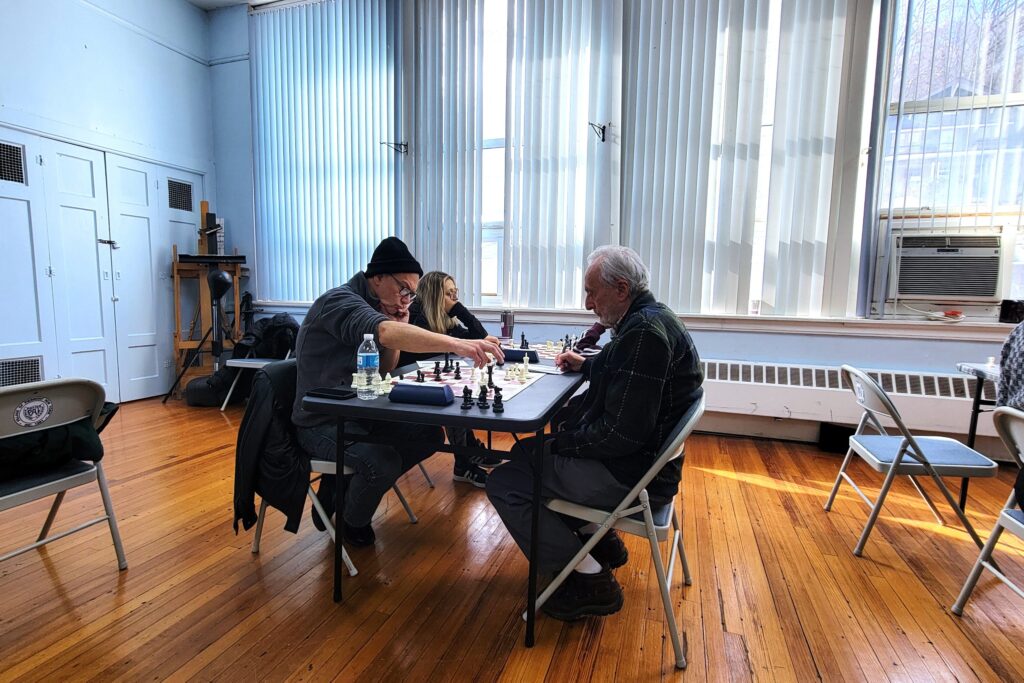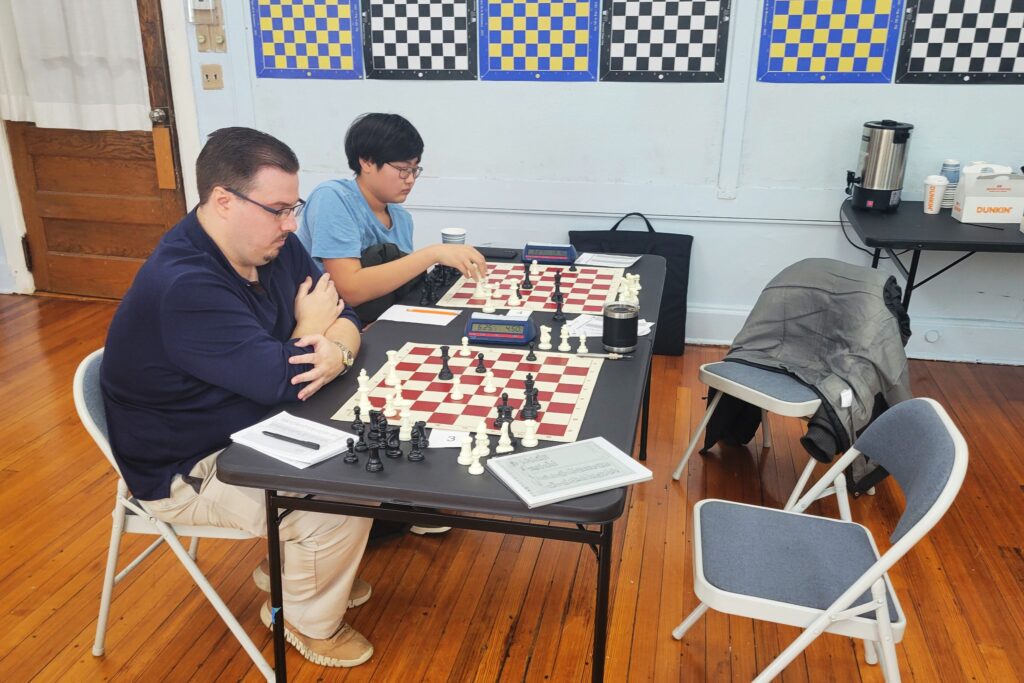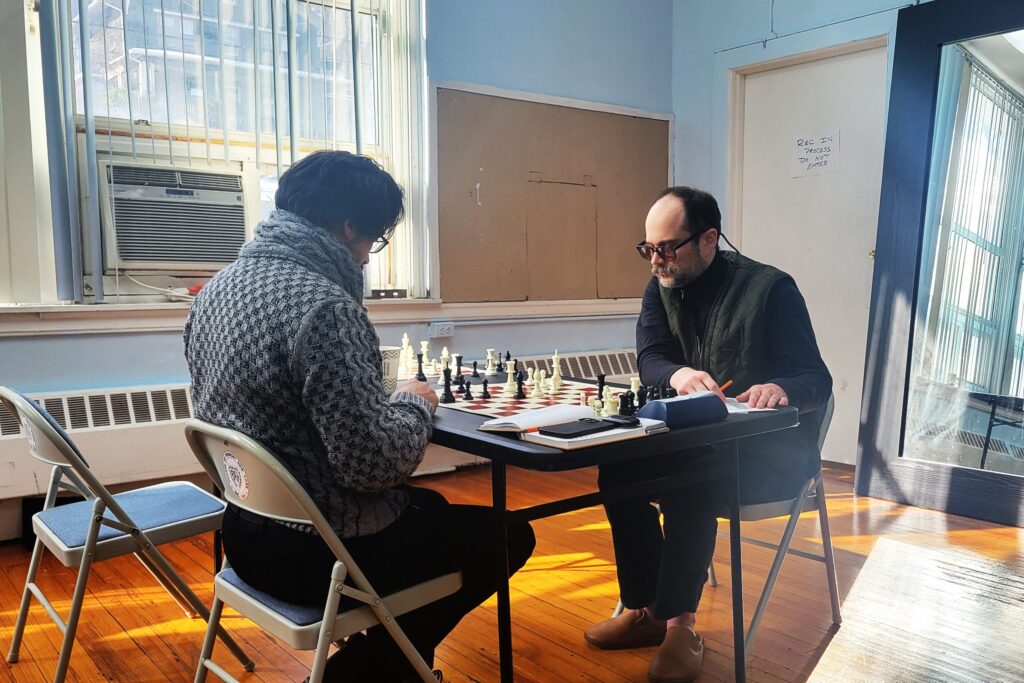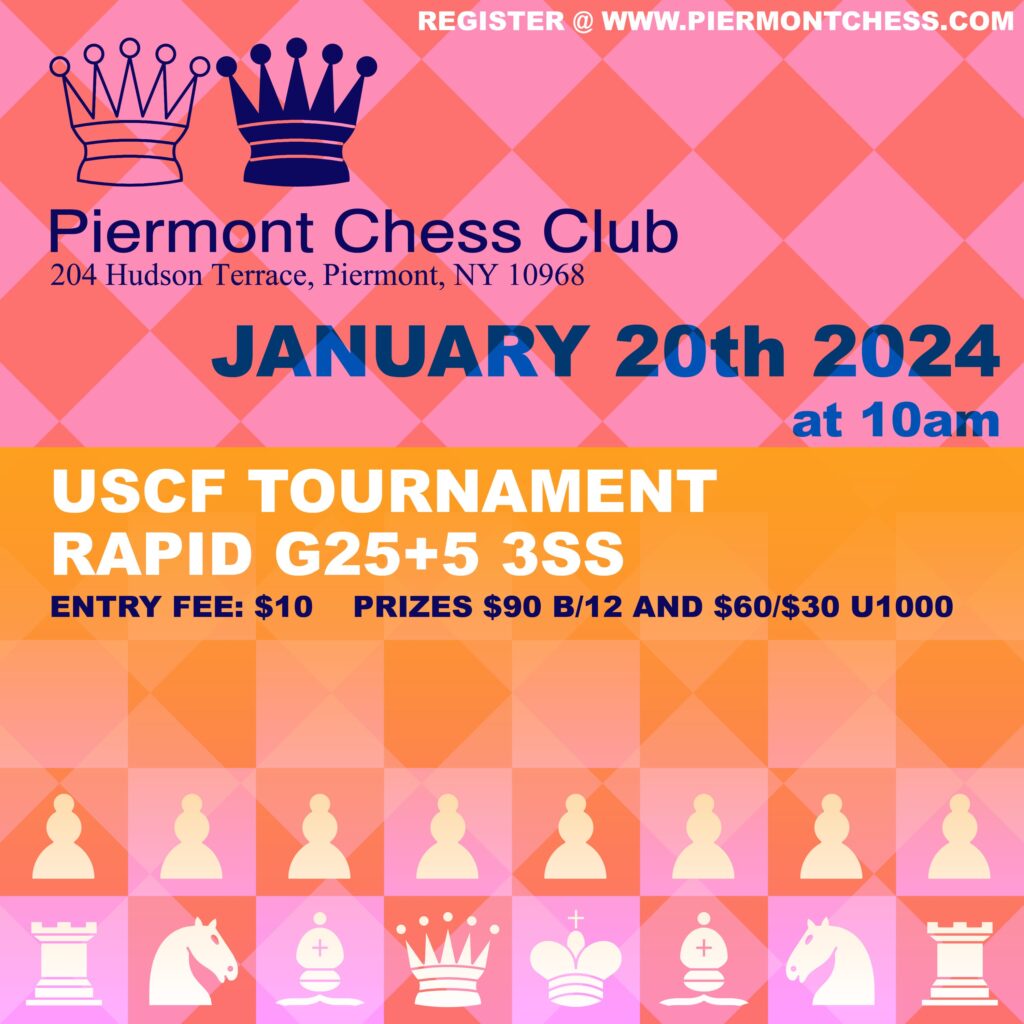Results are in for the first rated tournament games of the year at Piermont Chess! It was a nice and succinct, 3 round competition on a bright, cold day.
Congratulations to the winners!
First place: Artem Aleksenko
Best U1000: Peter Graham
Select Games from the Tournament
1. Jacob Kim vs. Joseph Burns
That game was pretty competitive. At 75 moves, it ended as a draw and was a dead heat the majority of the time, and each player received high marks from the engine, playing ~83% accuracy ~1300 rating level. But both players missed significant chances to take a win, (there were also 3 instances of “draw by repetition”!) Admittedly, the final forced stalemate was pretty clever.
White had advantages through most of the opening and middlegame and was the first to miss a winning chance on move 43. White played 43. Qh4?! but Qe3+ forced a trade of queens that gave white better chances to promote and win. On move 60 Black made a major blunder that went unnoticed with 60…g4?? White could have pinned the queen, again forcing a trade of queens and allowing a winning promotion.
With 68…Qxf2+, Black had their chance, but lost the line with 69….Qxg3 clearly hoping for a mate. Instead, 69…Qf1+ would have allowed 70. Kh2 Qh3+! forcing the queen trade in Black’s favor this time… c’est la vie.
2. Stephane Derveaux vs. Damian Bias
A very competitive game. White took the advantage toward the middlegame and held on to it but almost let it slip toward the end. White missed a hard to find tactic on move 12. Black played 11…Rad8 which was marked a blunder because White could play 12. f5! attacking the bishop. This is significant because the bishop must take the pawn or be captured. Once the pawn is taken, White will have been forced to walk into a double attack of two pieces defended only by the now overloaded queen. The bishop will fall to the rook on f1, after Nxd5 and Qxd5. No matter what, White is up a full piece.
White almost lost it with 20. Rae1?? but Black missed the move 20…Nd2 forcing white to give up a rook. Black had one more chance after 36. d5? but it was also hard to see while under pressure. The pawn on a3 was very close to promoting and with the right sequence Black could have won White’s rook and entered a favorable rook vs. bishop endgame. But it appears white picked off enough pawns that Black resigned.
3. Parth Gulati vs. Stephane Derveaux
Very nice game by both players. White was playing very nicely showing understanding of some advanced concepts, but missed something that even Black did! 8…Qxb2?? was a huge blunder! Very hard to see, but White could have trapped Black’s queen with 9. Na4!! and gone a queen for a rook very early in the game. The knight forks that White did decide to employ were initially a good idea, but unfortunately led to losing a knight when black forked two pieces with 16…d5. Black held onto that advantage, and White threw in the towel at move 36.
4. Peter Graham vs. Stephane Derveaux
Another competitive game where Black may have been able to equalize with more accurate play. Both had a decent opening, but White overpowered Black in the middlegame. Black did their best to keep things balanced but allowed a renegade bishop to escape unharmed. When White moved in with the knights and forked the bishop and rook, Black was already down 1 piece. With another on the chopping block Black’s position was all but lost. The notation ended here but white went on to simplify and win maintaining a 1 piece advantage.
5. Artem Aleksenko vs. Billy Zifchak
Intense game, but white generally had the upper hand throughout. Black neglected to push the push the d pawn and take other advantageous positions where white had left opportunities, but white had space advantage and was able to penetrate the kingside. Black’s big mistake was 21…Bb7, completely focused on a minor double attack to crack the queen side, while oblivious to the queen and bishop battery threatening an h7 mate.
6. Artem Aleksenko vs. Josh Pinchuk
A powerhouse game of chess between the #1 and #2 for 1st place, where both players were performing well above their ratings. A balanced opening led to a tricky position where Black missed a move that was hard to see, playing 19…Qe7?? leaving a knight hanging. The best option for Black was actually 19…fxe3 where White is encouraged to trade bishops thereby letting Black defend the knight with the rook on a8. Alternatives put the White queen in danger while losing tempo. White continued to gain on its advantage through the middle game and with 27…Rxf3?? Black appeared to read things as futile.
7. Billy Zifchak vs. Anna Kupchik
Opening with 1. Nf3, White couldn’t help but try the Tennison gambit when Black played 1…d5. But Black took an early lead refusing to fall into any traps. White was feeling the pressure until a fork was revealed. The knight guarding f7 was forced to displace and 21…Nc6?? allowed 22. Bf7! that turned the tables. The end of the game wasn’t notated as the clocks were within 1 minute of flagging. White was ultimately able to simplify, promote a pawn and catch a mate on the A file. Wild but intense game.
8. Damian Bias vs. Billy Zifchak
What a wild game! Excellent opening by both throughout move 15, with wild swings afterward. Tricky positions and misplaced priorities allowed misses and blunders on both sides. Every candidate move that Black considered-but didn’t make-was apparently the best move. White was hyper-focused on getting that mate in the corner, but once things were equalized and the king side was opened up, it was too late to promote that passer pawn on e7.





